Điểm nhấn
-
 Hội thảo “Thực trạng người Việt Nam hồi hương từ Vương quốc Anh giai đoạn 2014 - 2023”
Hội thảo “Thực trạng người Việt Nam hồi hương từ Vương quốc Anh giai đoạn 2014 - 2023”
-
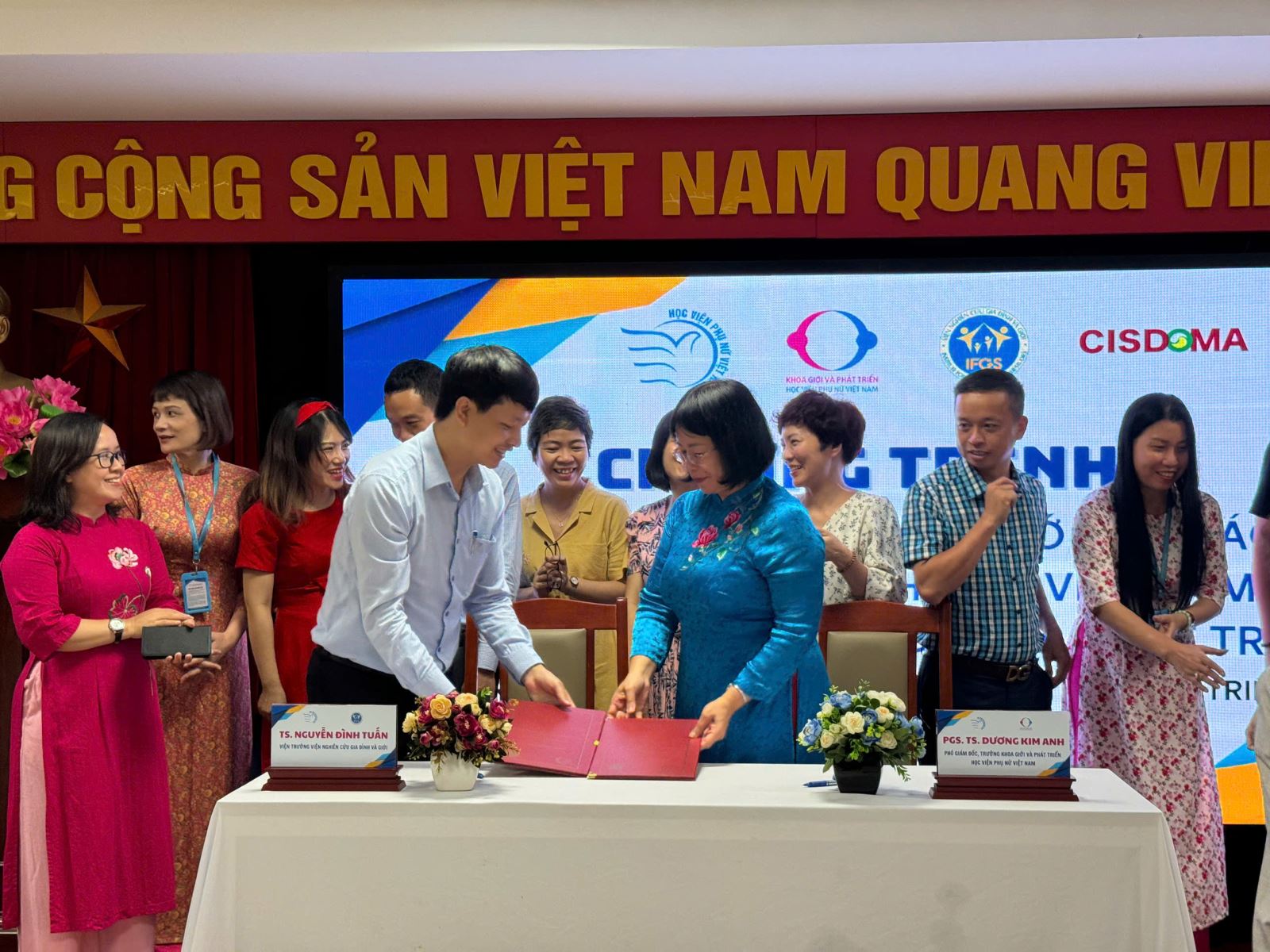 Lễ Ký kết biên bản ghi nhớ hợp tác giữa Học viện Phụ nữ Việt Nam với Viện Nghiên cứu Gia đình và Giới
Lễ Ký kết biên bản ghi nhớ hợp tác giữa Học viện Phụ nữ Việt Nam với Viện Nghiên cứu Gia đình và Giới
-
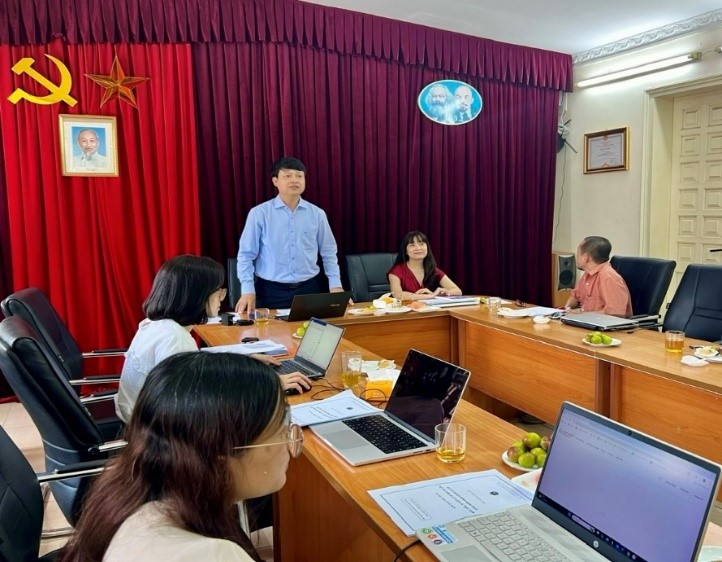 Hội thảo khoa học: "Bộ chỉ số gia đình hạnh phúc: Một số vấn đề lý luận và thực tiễn"
Hội thảo khoa học: "Bộ chỉ số gia đình hạnh phúc: Một số vấn đề lý luận và thực tiễn"
-
 Tọa đàm khoa học "Vận dụng lý thuyết trong nghiên cứu khoa học xã hội"
Tọa đàm khoa học "Vận dụng lý thuyết trong nghiên cứu khoa học xã hội"
-
 Hội nghị Đối thoại giữa Chi ủy, Lãnh đạo viện với đảng viên, viên chức và người lao động Viện nghiên cứu Gia đình và Giới 6 tháng đầu năm 2024
Hội nghị Đối thoại giữa Chi ủy, Lãnh đạo viện với đảng viên, viên chức và người lao động Viện nghiên cứu Gia đình và Giới 6 tháng đầu năm 2024
-
 Chi bộ Viện nghiên cứu Gia đình và Giới tổ chức sinh hoạt chuyên đề: Đoàn kết thống nhất trong Đảng theo tư tưởng Hồ Chí Minh
Chi bộ Viện nghiên cứu Gia đình và Giới tổ chức sinh hoạt chuyên đề: Đoàn kết thống nhất trong Đảng theo tư tưởng Hồ Chí Minh
-
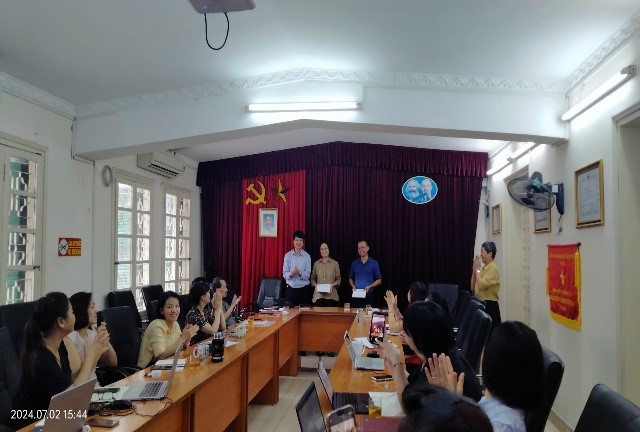 Cuộc thi “Nét đẹp và giá trị gia đình Việt Nam” hưởng ứng Ngày Gia đình Việt Nam 2024
Cuộc thi “Nét đẹp và giá trị gia đình Việt Nam” hưởng ứng Ngày Gia đình Việt Nam 2024
-
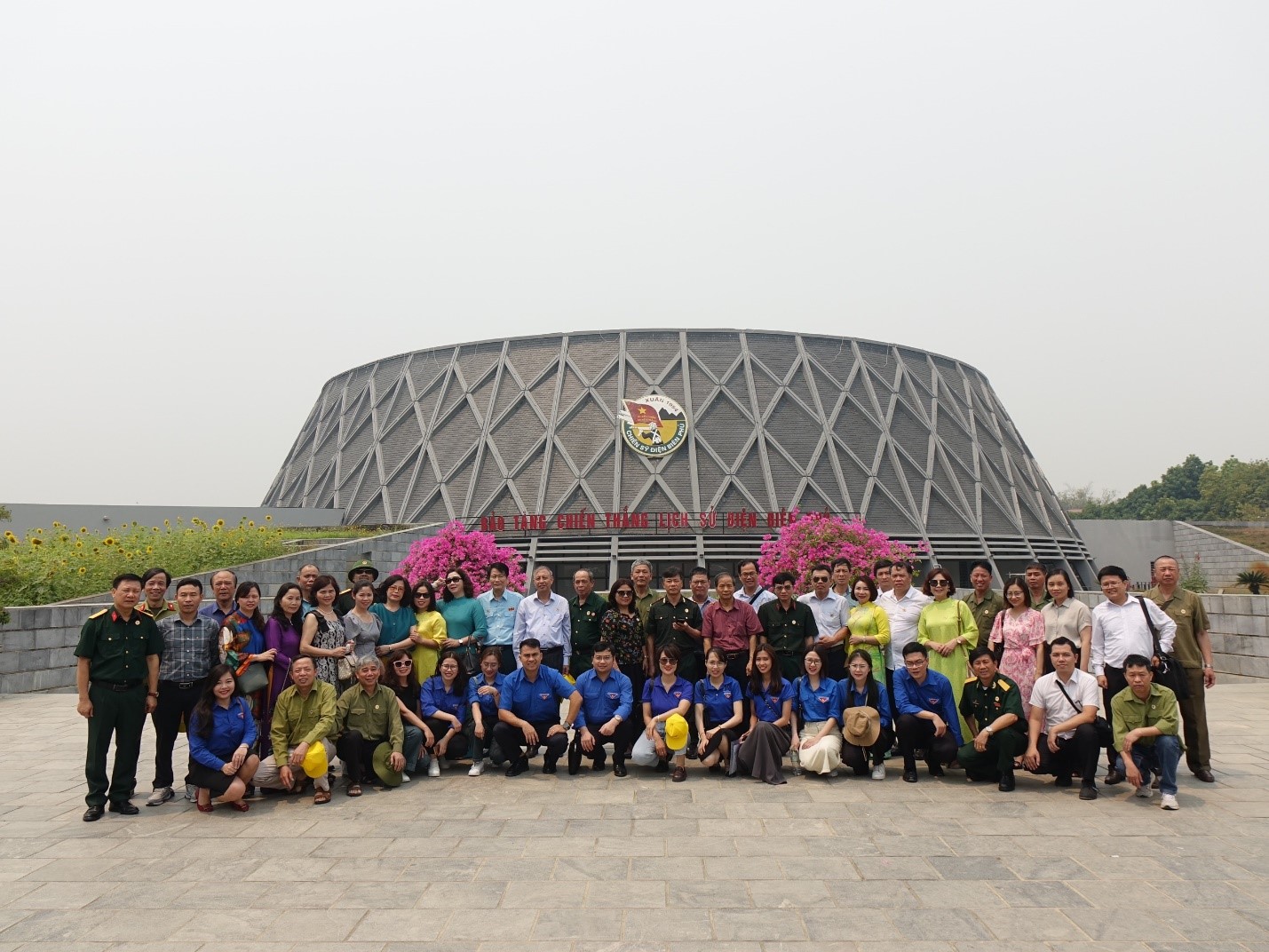 Hội Cựu chiến binh, Đoàn Thanh niên Viện Hàn lâm Khoa học xã hội Việt Nam đi thăm lại chiến trường xưa Điện Biên Phủ
Hội Cựu chiến binh, Đoàn Thanh niên Viện Hàn lâm Khoa học xã hội Việt Nam đi thăm lại chiến trường xưa Điện Biên Phủ
- Tổng mục lục Tạp chí 2023
-
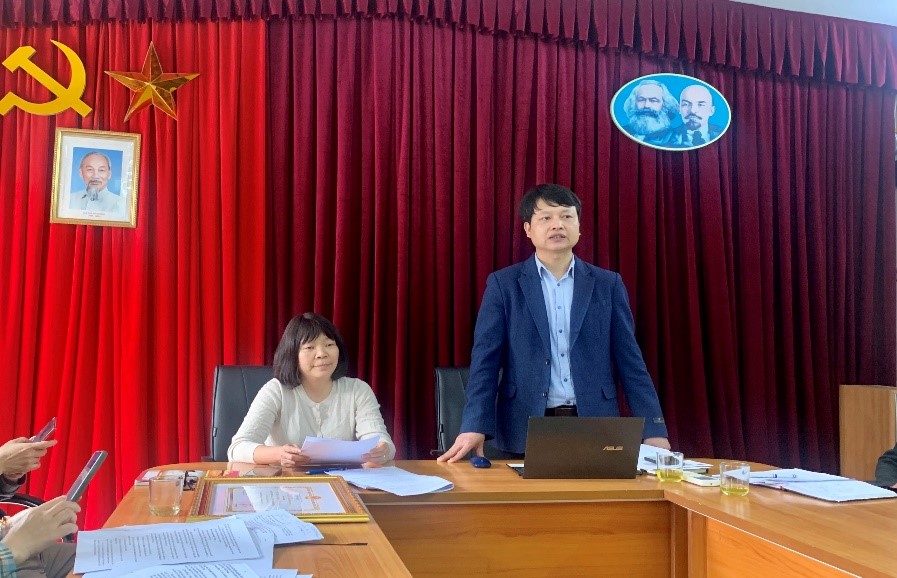 Viện nghiên cứu Gia đình và Giới phát động phong trào thi đua và ký Giao ước thi đua năm 2024
Viện nghiên cứu Gia đình và Giới phát động phong trào thi đua và ký Giao ước thi đua năm 2024
Liên kết web
Số lượt truy cập
22
5407462
Chi tiết tạp chíNo. 1 - 2016
Launching Workshop of the Study Report “Women in Agriculture and Comprehensive Growth in Vietnam”
On May 12th 2016 in Hanoi, the IFGS, the UN Women, and the Department of Foreign Affairs and Trade of Australia (DFAT) held a workshop to launch the research findings of “Women in Agriculture and Comprehensive Growth in Vietnam”.
The workshop attracted the participation of policy-makers, researchers, practitioners from foundations, research institutions, GOs and NGOs working in the fields of family, women, gender equality, agricultural and rural development such as MARD, MOLISA, MOF, MPI, Vietnam’s WU, CARE Vietnam, and World Vision Vietnam.
“Women in Agriculture and Comprehensive Growth in Vietnam” is a qualitative study which was conducted in 2015 by the IFGS with technical and financial supports from UN Women and DFAT. The research target was to analyze the unrevealed impacts of policies and social, economic, geographical characteristics on the livelihoods of women in agriculture, focusing on rice and fruit planting groups. The study was carried out over the four representative provinces of Hai Duong, Hoa Binh, Binh Dinh and Tien Giang with the total volume of 72 in-depth interviews and 24 focus group discussions. Respondents consisted of men and women who planted rice and fruits, as well as local officials.
As shown in the research findings, women, particularly those in their middle age, were the major force in rice and fruit cultivation in numerous areas. This was a consequence of the migration to work in enterprises and industrial zones among young men and women. In almost all cases, women grew rice and made decisions about that. Meanwhile, men involved and decided more on fruit-planting. According to the research, the dramatic development of science, technology and market economy as well as the climate change have created both opportunities and challenges for women’s cultivation of rice and fruits. The support of farming machinery has promoted women’s self-confidence, withdrawn them from the dependence on men, and narrowed their direct exposure time to agricultural work. The market economy has brought them a favorable access to seeds, fertilizers and pesticides. Nevertheless, with their limited background on a clean agricultural production, such unconditional access might lead female farmers to the overuse of fertilizers and pesticides, which left unpredictable outcomes to their health and products. Additionally, opportunities for women, especially ethnic minority ones, to join agricultural extension training courses were inconsiderable. Women were bounded with farming techniques and inactive with climate changes. Female peasants were also facing with capital shortage and consumption market. Personally, women’s involvement in agriculture was restricted by their reliance on husband and their inferiority due to limited education background. Moreover, care work was still an obstacle for women’s full participation in farming work.
Workshop participants appreciated the study report as an crucial reference for managers and policy-makers in the fields of gender equality and women’s interests. The report has provided scientific evidences for the gaps in agricultural and rural development policies and programs; offered pivotal suggestions for the support and enhancement of women’s role in agriculture in Vietnam; and committed to the promotion of gender equality in agriculture – the area where numerous gender stereotypes still exist in Vietnam.
On 3rd June 2016 in Hanoi, Vietnam Academy of Social Sciences (VASS), Institute for Family and Gender Studies (IFGS), the United Nations Entity for Gender Equality and the Empowerment of Women (UN Women) and partners jointly organized the launching workshop of the study report “Towards Gender Equality in Vietnam: Making Inclusive Growth Work for Women.”
The objectives of the workshop are:
to present the findings and policy implication of the Study “Towards Gender Equality in Vietnam: Making Inclusive Growth Work for Women” to policymaking bodies and academic circle on women studies and gender equality in Vietnam
to discuss the findings of the Study Report in the context of Vietnam’s current macroeconomic developments.
Expected results of this activity are (i) the working trails for each area of the Study results in the linkage with the implementation of the SEDP 2016-2020 and other key policy frameworks will be identified for further work (ii) the roadmap for possible policy recommendations for the improvements of women’s and girls’ employment, economic livelihood and participation will be explored for further focus in the coming time.
The Study Report “Towards gender equality in Vietnam: Making inclusive growth work for women”, which completes after two years of data collection and analysis, was commissioned by UN Women in Vietnam with support from the Government of Australia, the European Union Delegation in Vietnam, and research partners in Vietnam, including Institute for Family and Gender Studies.
The objective of the Study is to examine to what extent Vietnam’s commitment to gender equality is reflected in its economic reforms and economic growth model, and to what extent these can be made more effective in terms of advancing gender equality and women’s economic empowerment.
The workshop was attended by about 150 participants from Vietnam policymaking bodies and research institutions on gender equality and for the advancement of Vietnamese women. Those include:
- Policymaking bodies: Department of Gender Equality, National Employment Service Center (Ministry of Labour, Invalids and Social Affairs); Ministry of Planning and Investment; Ministry of Agriculture and Rural Development; Ministry of Finance; Ministry of Health; Ministry of Education and Training; Ministry of Science and Technology; Social Affairs Committee of National Assembly; National Assembly Office; Committee of Ethnicity Minority Affairs (CEMA); National Commission of UNESCO Vietnam (Ministry of Foreign Affairs); Ministry of Justice.
- Policy advocacy organizations: Vietnam General Association of Trade Union; Women Entrepreneur Council; Women’s Union; Association of Vietnam Textile Industry
- Research institutions: Vietnam Academy of Social Sciences (Institute of Sociology, Institute of Vietnam Economics, Institute of Social Science Information, Institute for Family and Gender Studies); Ho Chi Minh National Academy of Politics; General Statistical Office (GSO); Vietnam Women Academy; Institute of Labour and Social Studies; National Foundation of Science and Technology Development (NAFOSTED); Hanoi University of Culture; Institute of Population and Social Studies.
- H.E Ambassador of the Kingdom of the Netherlands; Deputy Head of Mission of the Australian Embassy in Vietnam; representatives from Embassy of the Kingdom of Belgium, Norway, Spain and the European Union Delegation in Vietnam.
- Other international organizations in Hanoi: United Nations Development Program (UNDP); UN Women; UNFPA; Oxfam; CARE; ActionAid Vietnam; International Labour Organisation (ILO); the World Bank (WB); Asian Development Bank (ADB); USAID, the Asia Foundation; JICA.
- Local non-government organizations in Hanoi: Institute of Social Development Studies (ISDS); CSAGA; Reproductive Health and Family Institute; the Research Center for Gender, Family and Community Development (GFCD); CGFED; Institute of Population, Family and Children.
- Mass media
Associate Professor Dang Nguyen Anh, Vice-President of Vietnam Academy of Social Sciences, Ms Shoko Ishikawa, Country Representative of UN Women in Vietnam and Mr Layton Pike, Deputy Head of Mission of Australian Embassy in Vietnam delivered the opening remarks of the Workshop. The opening remarks emphasized the magnitude of gender equality efforts and the importance of the Study “Towards Gender Equality in Vietnam: Making Inclusive Growth Work for Women.”
The opening session was followed by the unveiling the report ceremony which introduced the full-length Report and Summary Report to all participants. After the research team presented the main findings and policy recommendations, experts and participants discussed the findings and recommendations of the Study Report in the current macroeconomic development context of Vietnam. The Report highlighted the evidence-based policy recommendations in an effort to realize women’s potential and livelihood improvements and called for broader interests through policies and gender-responsive economic development programs of the Central Government.
As the first comprehensive study looking into the economy through a gender lens, the study assessed Viet Nam’s current economic growth model and found that despite women contributing in large measure to economic development, the achievement of an inclusive growth model remains a challenge for Viet Nam. The report cautions that if the benefits of economic growth are unevenly distributed and poorly managed, integration could persist gender segmentation in the labour market, greater vulnerability of female workers and pay gap.
“Australia is pleased to have supported this study because it highlights that gender equality is not a side issue. From agriculture to education, women and men engage differently across different sectors of the economy, and may have different levels of access to resources and services. We need to understand the different ways that Viet Nam’s rapid economic transformation is impacting women compared to men, so that policies and actions can be targeted to enable everyone to benefit equitably from socio-economic development,” said Mr. Layton Pike, Deputy Head of Mission at the Australian Embassy in Vietnam at the launching workshop.
Vietnam’s participation in new trade initiatives, such as Trans-Pacific Partnership signed in 2015 and establishment of the ASEAN Economic Community will open up a range of exciting opportunities for growth, particularly in the manufacturing, garment and electronics sectors. However, current employment growth from earlier trade initiatives has been largely concentrated in unskilled jobs. Opportunities for training, skills development and promotion in these sectors have been limited, especially for women.
“Viet Nam’s current economic growth pattern is not giving adequate attention to ensure that women’s right to equally benefit from growth is being fulfilled. If current policies and priorities are not reviewed and reformed from a gender lens, further economic integration will leave women behind. Prioritizing gender equality should be at the core of development policy. An investment in women is an investment in economic grow,” said Ms. Shoko Ishikawa, UN Women Country Representative.
The report notes that while a number of job opportunities have opened up for female workers in export-oriented manufacturing sectors, women are less likely than men to receive training and be promoted. The gender-earning gap has also widened. It also found that agriculture is still the main source of livelihoods for a large portion of the population, particularly women in the Northern Midlands and Central Highlands regions, but a large share of them work without pay on their family farms. This leaves them vulnerable, with limited opportunities to earn more secure incomes and become more productive. Like in many other countries, women in Vietnam also spend disproportionately more time on unpaid domestic work than men. The burden of unpaid work limits women’s access to economic opportunities and capacity to engage in paid work as well as impacts on power dynamics within households.
“The study is a great result of close partnership and coordination between international and national organizations. In order achieve substantive equality, it is necessary to have policies that are inclusive for women and vulnerable groups,” said Associate Professor Dang Nguyen Anh, Vice-President of Vietnam Academy of Social Sciences while emphasized that the launch of the report is a vivid evidence of the close tie between local and international organizations for gender equality in Vietnam.
To download the full-length and summary reports of the Study, visit the Asia-Pacific UN Women website: http://asiapacific.unwomen.org/en/news-and-events/stories/2016/06/landmark-report-warns-of-widening-gap
Mediated Representation of Sex and Pleasure in Contemporary Vietnam: a Case of Lua Am Magazine
Abstract: In contemporary Vietnam, State concern regarding sexual matters focuses almost exclusively on the sexual and reproductive health of women, encouraging improvement in the material ‘quality’ of the population. This example of State ‘bio-power’ discursively directs women away from pursuing unconfined pleasure fearing the threat of disease, delinquency or even death. This article examines changing notions of intimacy in the Vietnamese media, focusing on a women’s magazine, Lua Am. We argue that this emerging media further underscores the values outlined by the State, contemporary ‘Western’ consumption practices undergirding promotion of ‘selfish’ attitudes, to achieve ‘perfect’ Western lifestyles.
Attitude to Divorce of Young Married People in Vietnam
Abstract: Based on in-depth interview with 60 married people, aged under 30 in Thai Binh and Hanoi, the author investigates the attitudes of young people to divorce. The data reflects two apparently different attitudes to divorce. The first is rejecting divorce for the benefits of children and prevention from bad reputation for divorcees as well as their families, particularly in rural area. The second is open-minded opinion, commonly in urban area, considering divorce as an alternative to unhappy marriage. Nevertheless, young people in both two areas support divorces in the cases of adultery and domestic violence.
Negotiating Gender Roles of Vietnamese Spouses in Taiwanese Family
Abstract: Drawing on an ethnographic research in Tainan, Taiwan, this paper seeks to contribute on how the gender role expectations of Vietnamese spouses changed after migration to Taiwan, which the strategies do these women employ to negotiate their identities in navigating the space between “home” and “host”. The findings in this study showed that immigrant women who are economically viable are also independent. They have adapted and acclimated into their host society more quickly than others. Moreover, their position in the family is secure, and their family relationships have become more equal. For example, as the dual breadwinner model shows, working wives saw themselves as equal partners who were contributing to their families. This new egalitarian image of Vietnamese spouses may help to not only temper the bias of Taiwanese husbands and their families, but also, shatter the stereotypes currently applied to many Vietnamese spouses.
Changing Demographics and Challenges for Old-age Support in Vietnam
Abstract: The article touched a cross-cutting issue of policy reorientation to effectively adapt with the Vietnam’s changing demographics such as the diminishing “demographic dividend”, dramatic decline in fertility, rising longevity, increased mobility of people and urbanization, and especially rapid aging. According to the authors, there is need for a more coherent approach to old-age support. Rather than multiple fragmented programs with overlapping target groups and objectives, it would be desirable to provide a more coherent package of support. Fragmentation leads to high costs and poor delivery of programs. A more consolidated and social pension scheme could better leverage human development outcomes, and be scalable to respond to economic crises.

